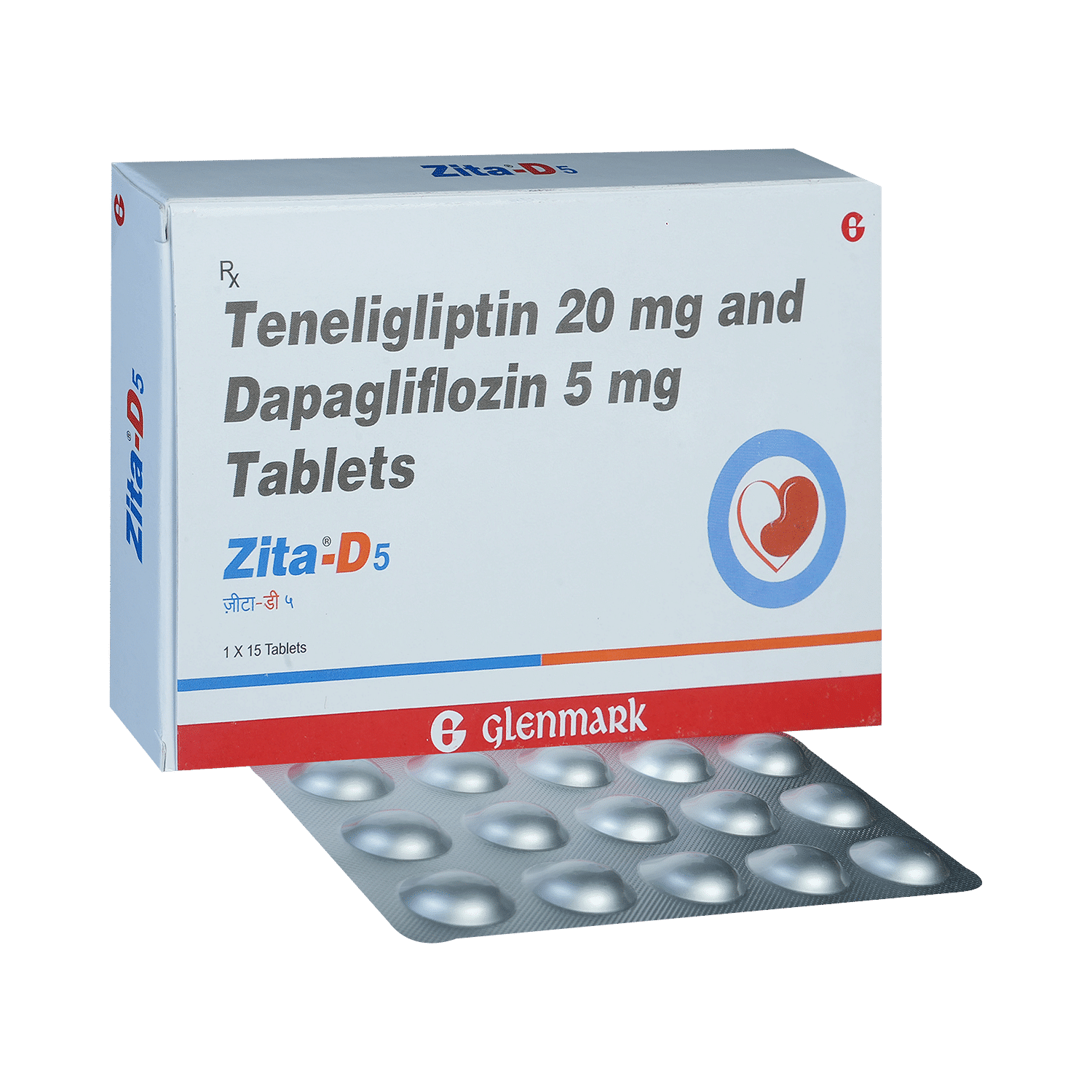
Dapzigard T 5mg/20mg Tablet
Manufacturer
Leeford Healthcare Ltd
Salt Composition
Dapagliflozin (5mg) + Teneligliptin (20mg)
Key Information
Short Description
Dapzigard T 5mg/20mg Tablet is a combination of two medicines used in the treatment of type 2 diabetes mellitus to improve glycemic control in diabetic patients.
Dosage Form
Tablet
Introduction
Dapzigard T 5mg/20mg Tablet can be prescribed alone or together with other diabetes medications. All diabetes medicines work best when used along with a healthy diet and regular exercise. Take it in the exact dose and duration as prescribed by the doctor. You should take it regularly and at the same time each day to get the most benefit from the medicine. Do not stop taking the medicine unless your doctor recommends it. It helps to control your blood sugar levels and helps prevent serious complications in the future. It is important to stay on the diet and exercise program recommended by your doctor while taking this medicine. Your lifestyle plays a big part in controlling diabetes. Some common side effects of this medicine include diarrhea, nausea, vomiting, upset stomach, and headache. Low blood sugar level (hypoglycemia) is a possible side effect if you are also taking other diabetes medicines like insulin or sulfonylurea, so you need to know how to recognize and deal with it.
Directions for Use
Take this medicine in the dose and duration as advised by your doctor. Swallow it as a whole. Do not chew, crush or break it. Dapzigard T 5mg/20mg Tablet may be taken with or without food, but it is better to take it at a fixed time.
Safety Information
Side Effects
No common side effects listed.
Alcohol Warning
It is not known whether it is safe to consume alcohol with Dapzigard T 5mg/20mg Tablet. Please consult your doctor.
Breastfeeding Warning
Information regarding the use of Dapzigard T 5mg/20mg Tablet during breastfeeding is not available. Please consult your doctor.
Pregnancy Warning
Information regarding the use of Dapzigard T 5mg/20mg Tablet during pregnancy is not available. Please consult your doctor.
How it works
Dapzigard T 5mg/20mg Tablet is a combination of two antidiabetic medications. Dapagliflozin increases urinary glucose excretion and reduces blood glucose levels. Teneligliptin works by increasing the release of insulin from the pancreas and decreasing the release of a hormone (glucagon) that raises blood sugar levels. This reduces fasting and post meal sugar levels.
Quick Tips
If you get unusually thirsty, pass urine more frequently, and feel tired, let your doctor know. These are signs that there is too much sugar in your blood and your dose may need adjusting. Monitor your blood sugar regularly while taking this medicine. Inform your doctor immediately if you experience rapid or deep breathing, muscle pain, fatigue, and drowsiness. Lifestyle changes like low sugar diet, exercise, losing weight, not smoking, and cutting down on alcohol may help this medication work better.
Related Medicines
Frequently asked questions
What foods should you avoid while taking Dapzigard T 5mg/20mg Tablet?
It is advisable to limit or avoid foods high in saturated and trans fats, such as processed meats and fried foods. Instead, consume healthy fats from sources like fish, nuts, and avocados. Additionally, control your carbohydrate intake as it directly affects blood sugar levels.
Is Dapzigard T 5mg/20mg Tablet safe to use?
Yes, Dapzigard T 5mg/20mg Tablet is generally considered safe when used as directed by the doctor. However, it may cause some side effects. For best results, it should be used in the correct dose and at the same time each day.
Can I stop taking Dapzigard T 5mg/20mg Tablet without consulting my doctor?
No, do not stop taking Dapzigard T 5mg/20mg Tablet suddenly or without discussing it with your doctor first. Sudden discontinuation of this medicine may worsen diabetes symptoms. Inform your doctor if the symptoms bother you or no considerable improvement is seen in your condition.
Can people with diabetes include proteins in their diet?
Yes, people with diabetes should include proteins along with other essential nutrients in their daily diet. Proteins are one of the major energy providers and help maintain blood sugar levels. However, it's recommended to consume about 2-3 teaspoons of proteins in evening snacks to prevent hypoglycemia.
Are artificial sweeteners suitable for people with diabetes?
No, artificial sweeteners are not a good option for people with diabetes. They contain chemicals that can cause mild to severe side effects and should be limited or avoided as much as possible.
Can uncontrolled diabetes lead to kidney failure?
Yes, uncontrolled diabetes can cause kidney failure in the long run. The best way to prevent damage to kidneys is by keeping diabetes under control, making dietary changes, monitoring sugar levels regularly, getting routine blood tests done, and taking prescribed medications on time.
Can diabetes be completely cured?
While diabetes cannot be fully 'cured,' it can be managed with simple lifestyle changes, a healthy diet, and medication. With proper management, people with diabetes can lead a normal life without severe health complications affecting the heart, brain, kidneys, or eyes.



